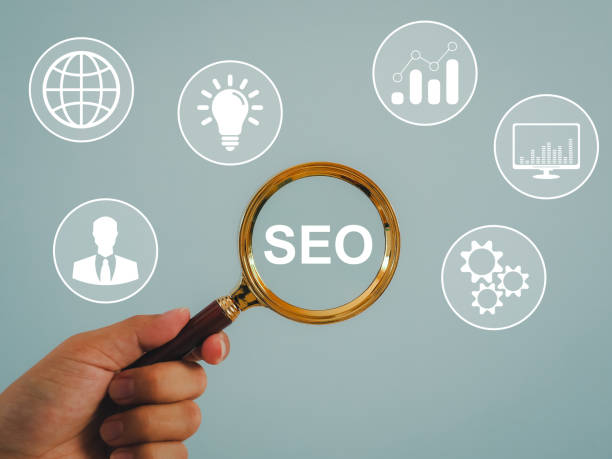What is SEO and Why is it Important?

#SEO, or Search Engine Optimization, is a process through which websites and their content are optimized to achieve better rankings in the search results of engines like Google, Bing, and Yahoo.
This vital process plays a key role in the visibility of businesses and websites in the competitive online space.
The importance of SEO is not limited to increasing website traffic; rather, it means attracting visitors who are actively searching for the products, services, or information you provide.
In other words, SEO helps you attract high-quality, targeted traffic.
Imagine you have a physical store; SEO is like the signposts and the location of your shop on a busy street.
The better your location and the clearer and more attractive your signs, the more customers will find you.
SEO optimization includes technical, content, and backlink aspects, each influencing ranking in its own way.
In today’s world, where users turn to search engines for every need, not being present on the first pages of search results means losing a large share of the target market.
The educational section of this article will help you gain a deeper understanding of this concept and why investing in SEO is not just an expense, but a long-term investment for the success of your business.
Further in this guide, we will explore various dimensions of SEO in a descriptive and step-by-step manner to help you on your path to becoming an SEO expert.
How much does losing business leads due to an unprofessional website cost you? Solve this problem forever with professional corporate website design by Rasaweb!
✅ Increase credibility and trust among potential customers
✅ Easier attraction of new business leads
⚡ Get a free consultation now!
Types of SEO and Its Strategies
![]()
To achieve an excellent ranking in search engines, understanding the types of #SEO and the strategies associated with each is essential.
In general, SEO is divided into three main categories: On-Page SEO, Off-Page SEO, and Technical SEO.
Each of these categories addresses different aspects of a website and requires its own specialized approaches.
On-Page SEO includes all actions you can take within your website to improve its ranking.
These include optimizing content with appropriate keywords, improving titles and meta descriptions, proper use of Heading tags, optimizing images, and URL structure.
The main goal of On-Page SEO is to create content that is not only engaging and useful for users but also understandable and accessible for search engines.
Off-Page SEO refers to activities performed outside your website designed to increase your domain’s authority and credibility.
The most important component of Off-Page SEO is link building; that is, receiving links from other websites.
The more quality links you receive from reputable sites, the more search engines will recognize your website as authoritative.
Other activities such as social media marketing and Brand Mentions also fall into this category.
Finally, Technical SEO focuses on optimizing the technical infrastructure of a website to improve its Crawlability and Indexability by search engines.
This includes site loading speed, mobile compatibility, using an SSL certificate, site structure, and Robots.txt and Sitemap.xml files.
A website with a strong technical infrastructure offers a better user experience and allows search engines to easily discover and index your content.
Understanding these three pillars of site optimization and how they interact is crucial for a comprehensive SEO strategy.
Keyword Research: The Backbone of SEO

#Keyword_Research is one of the most fundamental and important steps in any #SEO strategy.
This process involves finding the words and phrases that users type into search engines to find the information, products, or services you offer.
Without proper keyword research, all your efforts to produce content and optimize your website might be in vain, as you would be trying to attract an audience using the wrong keywords.
Keywords can be divided into different categories: Short-tail keywords, which are usually one or two words and have high search volume but also high competition (like “SEO”); and Long-tail keywords, which are multi-word phrases that have lower search volume but clearer user intent and higher conversion rates (like “SEO training for bloggers”).
To conduct effective keyword research, you must pay special attention to User Intent.
Is the user looking for information ( informational ), intending to buy ( transactional ), or looking for a specific path ( navigational )? Answering these questions helps you produce content that precisely meets user needs.
Various tools like Google Keyword Planner, Ahrefs, SEMrush, and KWFinder can assist you in this process.
The results of this research will guide you on what content to create, how your site structure should be, and ultimately how to attract organic and targeted traffic.
This initial step lays the foundation for a powerful search engine optimization strategy, and without it, progress in SEO will be difficult.
| Keyword Type | Example | User Intent | SEO Application |
|---|---|---|---|
| Short-tail Keywords | “SEO” | General, requires basic information | Usually for homepages or categories, high competition |
| Long-tail Keywords | “Best local SEO methods for small businesses” | Specific, requires details or purchase intent | Blog content, product pages, FAQs, high conversion rate |
| Transactional Keywords | “Buy Dell Laptop” | Intent to buy or perform a specific action | Product pages, service pages, contact pages |
| Informational Keywords | “What is SEO” | Search for information | Blog articles, guides, Q&A |
Optimized Content Creation for SEO

After identifying suitable keywords, the next step is to create #High_Quality_Content that is optimized.
Content is king in SEO, and without valuable content, even the best technical and backlink strategies cannot guarantee long-term success.
Your content should not only be understandable to search engines but, more importantly, it should be engaging, informative, and useful for users.
This means that simply stuffing text with keywords is not enough; the content must provide real value to the reader.
SEO-optimized content should include a combination of main and related keywords naturally incorporated into the text.
Using appropriate Headings (H1, H2, H3), utilizing lists, bolding important keywords, and adding relevant images and videos all contribute to the readability and appeal of the content.
Question-provoking content can encourage users to interact more with the site, while descriptive content helps them gain a deeper understanding of the topic.
In addition to quality, content length can also be influential; comprehensive and longer articles usually have a better chance of ranking for more complex keywords.
SEO optimization also includes regularly updating old content and publishing new news or analytical content.
This shows that your website is active and relevant, encouraging search engines to frequently revisit your site.
The ultimate goal of content creation in SEO is to provide an excellent User Experience that keeps users on your site longer and encourages them to return.
This positive interaction with the site sends important signals to search engines, which can help improve your ranking in SEO.
Does your current website convert visitors into customers or drive them away? Solve this problem forever with professional corporate website design by Rasaweb!
✅ Build credibility and powerful branding
✅ Attract target customers and increase sales
⚡ Get a free consultation now!
Technical SEO and its Importance in Ranking

#Technical_SEO is the optimization of a website’s technical infrastructure to help search engines crawl and index content more effectively.
This aspect of SEO, although less visible, is crucial for the overall success of your SEO strategy.
Technical issues can prevent even the best content or strongest backlink profiles from being seen.
One of the most important technical SEO factors is site loading speed.
Slow websites provide a poor user experience and can cause visitors to leave the site before the page fully loads.
Google and other search engines consider site speed a significant ranking factor.
Using Content Delivery Networks (CDNs), optimizing images, compressing files, and improving coding can help increase site speed.
Mobile-friendliness is also of high importance, as a large portion of today’s searches are performed via mobile devices.
A responsive website that displays correctly across various screen sizes is preferred by search engines and users.
Other aspects of technical SEO include using an SSL certificate (HTTPS), proper URL structure, fixing 404 errors, optimizing robots.txt and sitemap.xml files, and implementing structured data (Schema Markup).
Structured data helps search engines better understand your content and can lead to the display of Rich Snippets in SERP.
Proper guidance in this section can make a significant difference in your SEO performance.
This part of search engine optimization requires specialized knowledge and is often carried out by web developers or technical SEO specialists to ensure the website is structurally sound and search engine friendly.
Link Building and Off-Page SEO

#Off_Page_SEO, or external SEO, refers to a set of activities performed outside your website designed to increase your domain’s credibility and authority in the eyes of search engines.
The most important component of Off-Page SEO is Link Building.
Backlinks, or inbound links, are links that point from other websites to your site.
Google and other search engines consider backlinks as a “vote of confidence” or “referral” from one site to another.
The higher the number and quality of your backlinks, the more reputable and trustworthy search engines will consider your website, leading to improved rankings in SEO results.
However, not all backlinks are created equal.
The quality of a backlink is more important than its quantity.
High-quality backlinks from reputable, relevant, and high-domain authority websites are far more valuable than low-quality links from spammy or irrelevant sites.
Link-building strategies include creating valuable and shareable content that naturally attracts links (known as Link Earning), establishing relationships with bloggers and influencers, Guest Posting, Broken Link Building, and utilizing reputable directories.
Search engine optimization in the off-page section, in addition to backlinks, also includes activities such as social media marketing, Brand Mentions, and participation in online forums, all of which help increase your brand’s visibility and credibility.
These processes are often time-consuming and require an analytical and patient approach.
The goal is to demonstrate to search engines that your website is an authoritative and reliable resource in your industry, which ultimately leads to improved rankings and increased organic traffic.
SEO Tools and Performance Analysis

To succeed in #SEO, simply having sufficient knowledge is not enough; you also need the right tools to monitor your website’s performance, identify opportunities, and resolve issues.
SEO tools fall into various categories, each serving a specific purpose.
Google Search Console (Google Search Console) and Google Analytics (Google Analytics) are two free and essential tools from Google itself that provide vital information about your website’s performance in search results and user behavior.
Search Console shows you how your site is crawled and indexed by Google, which keywords generate traffic, and what issues (such as 404 errors or mobile problems) exist.
Google Analytics helps you understand visitor behavior, including where they came from, which pages they viewed, and how much time they spent on the site.
In addition to these free tools, there are also paid and specialized tools that offer more advanced capabilities.
Ahrefs and SEMrush are two examples of the most powerful all-in-one SEO tools that allow you to perform keyword research, backlink analysis, competitor analysis, and rank tracking.
Moz, Screaming Frog, and KWFinder are other tools, each powerful in specific areas such as domain analysis, technical crawling, or keyword research.
Using these tools gives you a deep analytical insight into your website’s SEO status and helps you make data-driven decisions to improve your search engine optimization strategies.
A skilled SEO specialist always uses a combination of several tools to achieve the best results.
| Tool Name | Type (Free/Paid) | Main Use | Important Notes |
|---|---|---|---|
| Google Search Console | Free | Monitoring search performance, indexing issues, keywords | Essential for any website, direct Google data |
| Google Analytics | Free | Analyzing user behavior, traffic sources, conversion rates | Comprehensive view of user behavior on the site |
| Ahrefs | Paid | Keyword research, backlink analysis, competitor analysis, technical SEO audit | One of the most comprehensive tools, strong backlink data |
| SEMrush | Paid | Keyword research, competitor analysis, on-page SEO, PPC | Comprehensive tool focusing on competitor analysis and overall SEO |
| Screaming Frog SEO Spider | Paid (limited free version) | Technical site crawling, identifying on-page and technical SEO issues | A powerful tool for technical site audits |
Local SEO and International SEO

#Local_SEO (Local SEO) and International SEO are two different approaches in search engine optimization that gain special importance depending on the scope of your business activity.
Local SEO is crucial for businesses that provide services to customers in a specific geographical area (such as restaurants, doctors, retail stores).
The main goal of local SEO is to increase visibility in search results for queries that include a specific location (e.g., “best café in Tehran”).
The most important tool for local SEO is Google My Business, which allows you to manage your business information and appear in Google Maps and local search results.
Optimizing your GMB listing, receiving positive customer reviews, building citations (mentioning business name, address, and phone number on other websites), and optimizing content for local keywords are among the important strategies in this field.
On the other hand, International SEO is suitable for websites that aim to target audiences in different countries and in various languages.
This type of SEO has more complexities and includes choosing the appropriate URL structure (such as subdomains, subdirectories, ccTLDs), using hreflang tags to specify the language and geographical region of each page, and localizing content through translation.
Descriptive content about your products or services must align with the target culture and language to be appealing to a global audience.
Challenges of International SEO include cultural differences, local regulations, and competition in different markets.
A successful international SEO strategy requires a precise analytical approach to target markets and correct technical implementation to ensure search engines can access different language versions of your site.
Tired of losing business opportunities due to not having a professional corporate website? Don’t worry anymore! With Rasaweb’s corporate website design services:
✅ Your brand’s credibility and professionalism will increase.
✅ You will attract more target customers and sales leads.
⚡ Get a free consultation now to get started!
Challenges and Future of SEO

The world of #SEO is constantly changing and evolving.
Search engines continuously update their algorithms to provide the best and most relevant results to users.
These changes create continuous challenges for SEO specialists, requiring constant adaptation and learning.
One of today’s biggest challenges is the emergence of Artificial Intelligence (AI) and Machine Learning in search engines.
Algorithms like Google RankBrain and MUM help search engines better understand user intent and provide more accurate results, even for complex or conversational queries.
This means that simply stuffing text with keywords is no longer sufficient; content must genuinely be valuable and useful.
Voice search is another significant challenge and opportunity.
With the increasing use of voice assistants like Siri, Google Assistant, and Alexa, the way users search is changing.
These types of searches are usually longer and more conversational, requiring new strategies in keyword research and content creation.
Search engine optimization for voice search focuses on long-tail keywords and direct answers to questions.
Question-provoking content can be very effective in this area.
Furthermore, increased online competition and the need to produce very high-quality and specialized content are other challenges.
The future of SEO tends towards User Experience (UX) and content quality.
Search engines are increasingly paying attention to signals such as Bounce Rate, time spent on site, and Click-Through Rate (CTR), all of which indicate user satisfaction with your content.
It is predicted that SEO will move further towards Semantic SEO, where search engines understand conceptual relationships between words and topics instead of just keywords.
This requires producing comprehensive and in-depth content that addresses all aspects of a topic.
Conclusion and Next Steps in the SEO Journey

As discussed in this comprehensive educational article, #SEO is a complex and multifaceted process that includes technical, content, and backlink-building aspects.
Success in search engine optimization requires a comprehensive approach, patience, and continuous effort.
From precise keyword research to creating high-quality and engaging content, and from technical website optimization to building a strong backlink profile, every step plays a significant role in improving your rankings and increasing organic traffic.
The world of SEO is dynamic, and with changes in search engine algorithms and the emergence of new technologies like AI and voice search, it requires continuous updating of knowledge and strategies.
For long-term success in SEO, it is recommended to:
First, constantly update your content with new and news-related information, ensuring your content addresses all dimensions of a topic.
Second, prioritize your website’s User Experience (UX).
Your site should be fast, responsive, and easy to navigate.
Third, regularly audit your site technically to resolve any potential issues that could prevent proper crawling and indexing by search engines.
Fourth, focus on building natural and high-quality links from reputable websites.
Fifth, use SEO tools to monitor your performance, identify opportunities, and analyze competitors.
Finally, remember that SEO is a marathon, not a sprint.
Results may not appear immediately, but with continuous effort and adherence to best practices, your website will gradually achieve higher rankings and attract valuable organic traffic.
This comprehensive SEO guide provides the initial steps and necessary guidance to start your journey.
Frequently Asked Questions
| Question | Answer |
|---|---|
| What is SEO? | SEO, or Search Engine Optimization, is a process for increasing the quality and quantity of website traffic by improving the site’s ranking in natural (organic) search engine results like Google. |
| What are the main types of SEO? | SEO is divided into three main categories: On-Page SEO, Off-Page SEO, and Technical SEO. |
| What does On-Page SEO include? | On-Page SEO includes optimizing elements within the website, such as keywords, Title Tag, Meta Description, content, URL structure, images, and internal links. |
| What is Off-Page SEO? | Off-Page SEO refers to activities outside the website that help improve its ranking, such as Backlink Building, social media marketing, and Brand Mentions. |
| What is Technical SEO? | Technical SEO focuses on optimizing the technical aspects of a website to help search engines crawl and index it better. This includes site speed, mobile-friendliness, site structure, Sitemaps, and the Robots.txt file. |
| What role do Keywords play in SEO? | Keywords are phrases that users enter into search engines. Proper and targeted use of relevant keywords in content and site elements helps search engines understand the topic of your page and display it for relevant searches. |
| What is a Backlink and why is it important? | A backlink, or inbound link, is a link from one website to another. Backlinks act as a “vote of confidence” from other sites for search engines and play an important role in a site’s credibility and ranking improvement, especially if they are from reputable sites. |
| What impact does quality content have on SEO? | High-quality, relevant, comprehensive, and unique content not only attracts and retains users but also shows search engines that your page is valuable. This helps improve rankings, reduce Bounce Rate, and increase user time on site. |
| Why is site loading speed important for SEO? | Site loading speed is a crucial ranking factor for Google. Faster sites offer a better user experience, have lower bounce rates, and are preferred by search engines. |
| Is SEO a one-time process? | No, SEO is a continuous and long-term process. Search engine algorithms are constantly changing, competition is increasing, and site content also needs updating. Therefore, SEO requires continuous monitoring, analysis, and optimization. |
And other services of Rasaweb Advertising Agency in the field of advertising
Smart UI/UX: A professional solution for improving SEO ranking with a focus on SEO-driven content strategy.
Smart Website Development: An exclusive service for online growth based on precise audience targeting.
Smart Digital Branding: A fast and efficient solution for increasing sales with a focus on intelligent data analysis.
Smart Sales Automation: A novel service for increasing click-through rates through marketing automation.
Smart Social Media: Professional optimization for increasing sales using Google Ads management.
And over hundreds of other services in internet advertising, advertising consultation, and organizational solutions
Internet Advertising | Advertising Strategy | Advertorial
Sources
SEO Principles Guide on Zoomit
Advanced SEO Techniques on Virgool
Online Success with SEO on Digikala Magazine
Comprehensive SEO Guide on Namnak
? Are you ready to revolutionize your business in the digital world? Rasaweb Afarin Digital Marketing Agency, specializing in SEO, content marketing, social media management, and personal website design, paves the way for your growth. To boost your business, contact our experts today.
📍 Tehran, Mirdamad Street, Next to Central Bank, Southern Kazaroon Alley, Ramin Alley, No. 6



